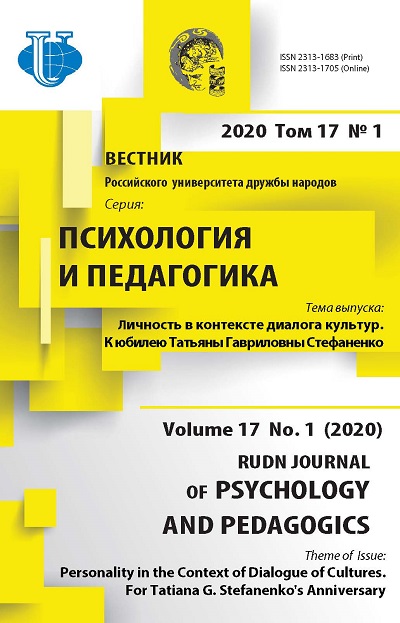Psychological Science at the United Nations: Historical Trends
- Authors: Takooshian H.1
-
Affiliations:
- Fordham University
- Issue: Vol 17, No 1 (2020): PERSONALIТY IN ТНE CONТEХТ OF DIALOGUE OF CULТURES. FOR TAТIANA G. SТEFANENKO’S ANNIVERSARY
- Pages: 209-213
- Section: SCIENCE CHRONICLE
- URL: https://journals.rudn.ru/psychology-pedagogics/article/view/23307
- DOI: https://doi.org/10.22363/2313-1683-2020-17-1-209-213
- ID: 23307
Cite item
Full Text
Abstract
Since the United Nations was formed by 51 nations on June 26, 1945, psychology organizations were slow to register with the UN as nongovernmental organizations (NGOs) in the past 75 years. This essay briefly describes the four-stage history of psychology NGOs at the United Nations, which have grown far more active and coordinated since 2004.
Full Text
Since the United Nations formed in 1945, it has reached out to “civil society” for experts to help in its global work. How have psychological scientists become involved in the work of the United Nations over 75 years? This historical analysis identifies a 4-stage evolution: moving from individual scientists like Otto Klineberg in UNESCO in the 1950s, to the new Psychology Coalition (PCUN) in 2010. 1. Prehistory. Starting in 1945, distinguished individuals were involved with agencies - such as Otto Klineberg (Figure 1) with UNESCO (Hollander, 2005). But unlike other fields such as economics and social work, psychology organizations were slow to affiliate with the UN for almost half a century. 2. NGOs. In 1976, the Association of Women in Psychology (AWP) became the first of a few psychology NGOs (nongovernmental organizations) to affiliate with the U.N. DPI (Department of Public Information) or EcoSoc (Economic and Social Council) (Takooshian, & Shahinian, 2008). This was closely followed by the International Council of Psychologists in 1981 (Sapir, Sandis, & Gell, 2000). Over half of the 19 current psychology NGOs affiliated with the UN after 1997 (see Table). 3. Coordination. Starting on 1 April 2004 at Pace University, some of these psychology NGOs began to coordinate their activities, involving about 60 psychologists in 8 groups at the U.N. (Figure 2). With a generous mini-grant from Merry Bullock, the incoming Director of the APA Office of International Affairs (OIA), the New York group of the APA Division of International Psychology published a roster of UN psychologists (Takooshian, 2005). From 2004 till 2010, Fordham hosted 7 gatherings each September with the annual UN - NGO conference. Since 2007, the UN building also hosted an annual “Psychology Day at the UN.” Figure 1. Prehistory, 1945-1976: Individual psychologists at the UN: first line (from left to right): Otto Klineberg, MD, PhD; Harry Stack Sullivan, MD; Charles E. Osgood, PhD; second line (from left to right): Edwin P. Hollander, PhD; Roger W. Russell, PhD; Herbert C. Kelman, PhD; third line (from left to right): Irving L. Janis, PhD; Morton Deutsch, PhD; Raymond D. Fowler, PhD Table Organization Formed NGO Website *APA: American Psychological Association 1892 1999 www.apa.org IPA: International Psychoanalytic Association Trust 1910 1998 www.ipa.org.uk *IAAP: International Association of Applied Psychology 1920 2003 www.iaapsy.org IAQ: International Orthopsychiatric Association 1924 1999 www.amerortho.org *SPSSI: Society for Psychological Study of Social Issues 1936 1991 www.spssi.org *ICP: International Council of Psychologists 1941 1981 www.icpweb.org *SIOP: Society for IndustrialOrganizational Psychology 1945 2011 www.siop.org WAWI: William Alanson White Institute 1946 www.wawhite.org WFMH: World Federation for Mental Health 1948 1963 www.wfmh.org SCIENTIFIC CHRONICLE Такушьян Г. 2020. Т. 17. № 1. С. 209-213 Table, ending Organization Formed NGO Website *IUPsyS: International Union of Psychological Sciences 1951 1998 www.iupsys.org AWP: Association for Women in Psychology 1969 1976 www.awpsych.org IOA: International Ontopsychology Association 1978 1999 www.ontopsicologia.org ISPA: International School Psychology Association 1982 2004 www.ispaweb.org ISTSS: International Society for Traumatic Stress Studies 1985 1993 www.istss.org *EHPS: European Health Psychology Society 1986 2015 www.ehps.net IFTA: International Family Therapy Association 1987 1999 www.iftafamilytherapy.org *IMCES: Institute for Multicultural Counseling & Education Services 1989 2010 www.imces.org *ATOP: Association for Trauma Outreach & Prevention 1990 2009 www.meaningfulworld.com WCP: World Council for Psychotherapy 1995 2003 www.worldpsyche.org Note. * - 9 of 19 UN Psychology NGOs in PCUN in 2019. Figure 2. On 1 April 2004, the first gathering of psychology NGOs at Pace University Figure 3. In 2018, a monthly meeting of PCUN, the Psychology Coalition of NGOs Accredited at the United Nations Takooshian H. RUDN Journal of Psychology and Pedagogics, 2020, 17(1), 209-213 4. Coalition. Starting in 2010, the Psychology Coalition at the UN (PCUN) formed as an umbrella group with formal bylaws and membership, which now numbers over 100 psychologists and student interns representing nine of 19 psychology NGOs (Figure 3). The mission of psychology is commonly divided into five parts: science, practice, education, consultation, and advocacy. Clearly, psychological science must be basic to the other four parts. Though all five parts are now represented at the United Nations, the trend has shifted from advocacy to more a diverse range of activities, including evidence-based research addressing the United Nations’ 8 Millennium Development Goals (MDGs) for 2015, and 17 Sustainable Development Goals (SDGs) for 2030.×
About the authors
Harold Takooshian
Fordham University
Email: takoosh@aol.com
PhD, is Professor of Psychology, Urban Studies, and Organizational Leadership 113 W. 60th St., New York, 10023, NY, United States of America
References
- Hollander, E.P. (2005, Summer). APA committee activity at the UN in the early 1960s. International Psychology Reporter, 9 (2), 22-23
- Sapir, S.G., Sandis, E.E., & Gell, L.T. (2000). A history of NGOs' work at the United Nations. New York: International Council of Psychologists. [38-minute DVD]
- Takooshian, H. (Ed.). (2005). Roster of psychologists at the United Nations, first edition. New York: FIRST, Fordham Institute for Research, Service, Teaching
- Takooshian, H., & Shinian, S.P. (2008, October). Psychology at the United Nations: A brief history. Psychology International, 13-14. Retrieved: https://www.apa.org/international/pi/2008/10/un
Supplementary files















